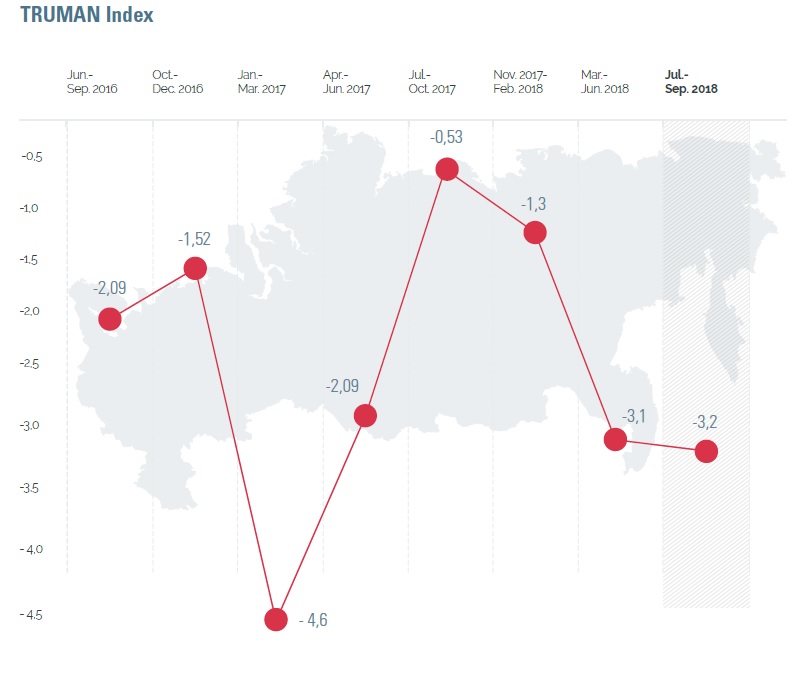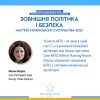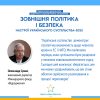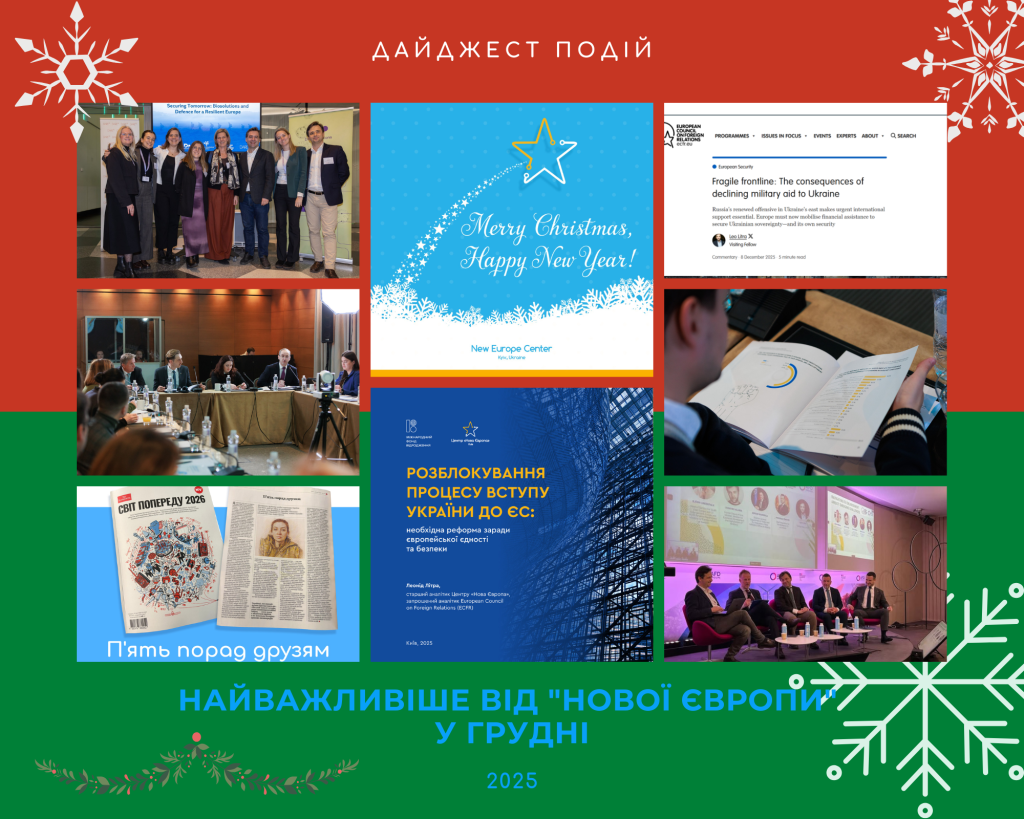Report by Sergiy Solodkyy, First Deputy Director of the NEC, on assessment of Ukraine’s relations with Russia for the quarterly magazine ТRUMAN Index. The full version of TRUMAN Index No. 4 (8) is available on the TRUMAN Agency website
July-September 2018
Positive points: 0
Negative points: -64
Total: -64
TRUMAN Index: -3.2
Update
The closer it gets to elections in Ukraine, the more noticeable the blend of foreign and domestic policy, with the Russian factor becoming a decisive one in election discourse. Russia has become the launching point and the marker that divides various camps and determines key ideologemes. One section of the political spectrum is doing everything it can to distance itself from anything related to Russia while the other, by contrast, is insisting on the search for a compromise with the country that has kept Ukraine in a state of war for more than four years. One major aspect of the current electoral race is the hunt for skeletons in the closets of any and all political players who can be linked to covert or overt cooperation with Russia. In fact, all the key players, other than the novices, can be found on the lists of those who have imagined or real Kremlin tracks leading to their doors. As a result, a fair number of events in Ukrainian-Russian relations during this reporting period were linked, one way or another, to the electoral process and just about every decision could be extrapolated to electoral interests. For instance, President Poroshenko introduced the idea of adding provisions to the Constitution about Ukraine’s Euroatlantic integration to demonstrate its definitive break with Russia. During this period, the issue of granting Ukraine’s Orthodox Church autocephaly or independence from Russia’s religious influence came to the fore. In September, Ukraine’s leadership decided not to prolong its Treaty on Friendship with Russia, which will now expire on March 31, 2019. This was effectively Ukraine’s answer to a critical question: How is it that the country is in a state of war with Russia but the friendship treaty is still in effect? The continuing review of bilateral treaties became one of the main issues during this quarter. With Russia increasing pressure in the Azov Sea, the Ukrainian government has been thinking about cancelling the treaty on cooperation in the Azov Sea as well.
Operation Abrogation: Russia treaties under review
Ukraine effectively launched a kind of audit of its treaties with Russia in the early days of Russian aggression, back in spring 2014, but it did not dare to take radical steps for a variety of reasons: Ukraine’s leadership was reluctant to break diplomatic relations and it wasn’t prepared to institute a visa requirement with Russia because this would have affected millions of Ukrainian citizens who regularly traveled to Russia, both to visit relatives and to work. Altogether, the two countries had signed a total of 451 bilateral international treaties prior to the war.
After Russia’s invasion, a review of the treaty base was begun. As of spring 2018, Ukraine decided to suspend or end one inter-state treaty, 25 intergovernmental treaties, 20 of which were Ukrainian initiatives and 5 of which were Russian ones, and 18 interagency agreements. The first ones to go were those related to security. So, back in 2014, Ukraine decided to stop cooperation between the Security Bureau of Ukraine (SBU) and Russia’s FSB. In 2015, an agreement on military and technical cooperation ended. Some security arrangements were ended much later, however. For instance, the 1995 agreement on the procedure for bilateral deliveries of arms and military equipment was only stopped this past spring. In short, in the four years since the war began, only 10% of bilateral treaties have been abrogated. Ukraine’s leadership is being very cautious about this process, carefully analyzing every provision and sometimes informing its international partners about the expediency of rejecting this or that bilateral document.
During this last quarter, the term “denunciation” became one of the most frequently heard in political discourse in Ukraine. At first, it was applied to the Treaty on Friendship, Cooperation and Partnership between Ukraine and the Russian Federation, which was ratified by the Verkhovna Rada in 1998. Ukrainian diplomats say that it wasn’t very convenient for Ukraine to abrogate this treaty as it could potentially offer Russia an ace-in-the-hole. Kyiv would not have easily been able to accuse Moscow of violating bilateral commitments had there been no such commitments—and the abrogation provided room to maneuver around this. Because of this, the Foreign Ministry decided to instead simply not renew the Treaty. This is provided for in Art. 40, which states that each side has the right to inform the other party about its intentions not to renew the treaty when it expires at the end of the most recent decade. Given that the treaty is up for renewal on March 31, 2019, Ukraine took this step in time.
The announcement that Ukraine would not extend the treaty gave rise to a storm of criticism in Russia. Officially, it came down to two key messages: one was that, from now on, Moscow would not be tied to any obligations; the second dismissed the current administration as short-sighted. Russia’s Foreign Ministry announced that relations would now have to be restored, “obviously with other, more responsible politicians in Ukraine.” This was nothing more than a transparent suggestion by Russian diplomats that the current leadership of a neighboring state needed to be replaced. And this has become the entire basis of Russia’s policies towards Ukraine: to ensure that politicians who are more loyal to Moscow come to power, are more amenable to agreements and will “fix the mistakes of their predecessors.”
Will the loss of the Treaty on Friendship lead to chaos and undermine all the bilateral agreements between the two countries? After all, many of the remaining ones are based on precisely this treaty. The domino effect of rejecting the foundation agreement ought to lead to the abrogation of dozens, if not hundreds, of others. Ukraine’s diplomats are more cautious here. While informing Russia about the decision not to extend the Treaty, Ukraine noted three principles:
- Not extending does not affect responsibility for eliminating violations of the Treaty that have emerged while it applied, meaning between April 1, 1999 and March 31, 2019.
- Not extending does not affect current court and other processes aimed at a peaceful regulation of disputes.
- Not extending does not affect Russia’s obligation to uphold other norms and rules of international law, including the remaining agreements still in effect between the two countries.
Meanwhile, Kyiv decided not to stop at the decision not to extend the Friendship Treaty. In July, MPs announced the need to abrogate the Agreement on Cooperation between Ukraine and Russia in the Azov Sea and Kerch Strait. Some of them even submitted a bill to that effect. Tensions in the Azov Sea began to rise already in spring 2018 as Russia began stopping and boarding merchant ships for inspections. It began with Ukraine’s Coast Guard stopping a Russian fishing vessel called “Nord” at the end of March. After this, Russia began to cause problems for ships moving across the Azov to Ukrainian ports, whether they were flying the Ukrainian flag or were registered elsewhere. Moscow explained that it was checking them for piracy, supposedly in line with international law. By early September, nearly 100 ships had been added to the list of those who had experienced extended Russian “inspections.” Interestingly, none of them filed a complaint against Russia—clearly fearing even more punishment from Moscow.
The Treaty on the Azov has three key provisions that are most often discussed in public. Firstly, the Azov Sea has historically been considered domestic waters of Ukraine and Russia, which narrows the options for applying international marine law to resolve bilateral disputes. Secondly, the treaty provides for freedom of movement to merchant vessels, which has already become a serious problem. Thirdly, military vessels of third countries may only enter the Azov Sea with the permission of both Ukraine and Russia, a provision that particularly angers Ukraine’s military, who unofficially talk about the interest of certain countries to enter Ukraine’s Azov Sea ports.
So far, Ukraine’s government has shown a more-or-less united front regarding the review of treaties with Russia—at least for public consumption. In the case of the Azov treaty, however, an obvious misunderstanding has appeared between different agencies. Observers have commented in public about the difference in approaches between the Foreign Ministry and the Presidential Administration. While Ukraine’s diplomats took care to tread lightly, Poroshenko and his advisors chose to use alarmist, anxious rhetoric. The president, for instance, stated, “We will not tolerate the illegal seizure of Ukrainian and foreign vessels,” whereas the Ministry said the situation was being “artificially exacerbated in the media.” Some foreign diplomats who have been monitoring the situation were left with more questions than answers.
Judging by everything, the position of Ukraine’s diplomats about the need to refrain from abrogation, a position that is supported by the Ministries of Justice and Defense, is based on recommendations from the international lawyers in British who have been advising Ukraine over its disputes in international courts. At this point, Ukraine has brought quite a few suits against Russia in a variety of courts but it has been feeling the shortage of qualified legal specialists precisely in international law and various narrower specializations, including marine law. The main problem is that many of them have a theoretical more than practical understanding about how different kinds of cases are reviewed in different international courts. Ukrainian diplomats have been quite open about consulting with international specialists during the preparation of documents for the International Court in The Hague. It looks like the latter have been advising the Ukrainian side to refrain from unnecessary noise around the Azov treaty—somewhat like the Miranda warning given by American cops: “Everything that you say can and will be used against you in a court of law.”
The main argument that the Justice and Foreign Ministries offer for refraining is precisely the concern over its possible influence on the review of other disputes between Ukraine and Russia in international courts. Diplomats are concerned about the psychological aspect of trying to predict which way judges might perceive Ukraine’s decisions, from delaying Nord Stream II all the way to a possible abrogation. In February 2018, the International Tribunal already had a memorandum from Ukraine with a list of all of Russia’s violations. Indeed, Russia had illegally sidelined Ukraine from exercising its rights as a maritime state, it had used and continued to use Ukraine’s sovereign resources in its own interests, and it had usurped Ukraine’s right to regulate its own maritime territories. In violation of international law, Ukraine argues, Russia is stealing Ukraine’s mineral and fisheries resources, causing losses to Ukraine’s fishing fleets, and blocking movement to Ukraine’s ports. In this quarter, the Tribunal first has to make a ruling regarding jurisdiction, because Russia has also challenged the hearing of Ukraine’s suits at the international level since this is about internal waters, to which international marine law does not apply. Ukraine will have to wait another 12-15 months for this ruling. The logic of its diplomats is that after this it will be possible to abrogate the treaty as it will do no good at the current stage and could also cause harm.
The Ukrainian Government is also worried that, should the abrogation process be started, Russia could decide, directly or through its agents of influence, to rile up Ukraine’s public, including Azov fishermen, who benefit from the effect of the agreement. The Port of Berdiansk keeps 1,056 people employed, while the Port of Mariupol provides 3,274 jobs. A complete blockade on Russia’s part could make the profitable functioning of these enterprises impossible, leading to serious losses. This would in turn stoke up social tensions in a relatively unstable region. However, what should be taken into account is that Russia has already been blockading the sea and the ports have already warned that they are running up losses.
The political camp that favors abrogation insists that this treaty should have been denounced long ago and then the country should have gone to the International Tribune. Right now, the chances are high that the tribunal will reject Ukraine’s claims and Kyiv will have lost valuable time to apply marine law full force.
The mark of Russia on Ukraine’s elections
Right now, just about every move in relations with Russia is judged in Ukraine through the prism of the upcoming elections. Yet politicians themselves coyly refuse to acknowledge any connection: everything is mere coincidence, supposedly, and nothing is intentional. The press tried to link the decision not to extend the Friendship Treaty to the elections, but its claims were not always supported by its arguments. After all, the timing of the elections and the end of the 10-year term of the treaty really is happenstance.
Meanwhile, official Moscow has more and more frequently this last quarter accused Ukraine’s politicians of having ulterior motives. On September 25, Russia’s MFA noted that the non-extension of the Friendship Treaty, steps to gain autocephaly for the Ukrainian orthodox church, and official complaints from Kyiv about Russia’s domination in the Azov Sea are all linked to electoral opportunism: “Obviously, in their unrestrained drive to gain points among Ukrainian voters for the future presidential race, Kyiv’s leadership is betting on the instant effect of populism, ignoring the long-term strategic interests of its own country.” At the same time, Russia makes no bones about it that it hopes to see politicians who will shift the country’s focus back to Russia in foreign policy come to power.
The Russian factor has played one of the main roles in all of Ukraine’s elections. This time is no different: the closer Election Day the more information about possible threats from Russia’s side. In Ukraine’s corridors of power, no one is hiding their concern over the possible rise in popularity of pro-Russian political forces especially in southern and eastern oblasts. So far, opinion polls have not shown such a rise in voter preferences towards individual politicians of this bent, but many voters in these regions are reluctant to talk about their preferences. There is a good chance that a large share of the undecideds is, in fact, voters who would support the idea of compromises with Russia.
The Russian factor is being used in electoral discourse in two ways: politicians who are open about their preference for restoring the old order with Moscow, and politicians who try to distance themselves from any suspicion of closeness, whether real or imagined, to Moscow and who use the Russian factor as a negative brand on others. Prior to the breakout of war, it was difficult to imagine a situation where any individual running for office in Ukraine might reject out of hand any connection with Moscow: on the contrary, many competed for Russia’s support.
President Poroshenko has even been accused from some corners of secretly cutting a deal with Vladimir Putin to keep the war going, supposedly because it was convenient to both of them to keep the population scared. Yulia Tymoshenko has been blamed for her gas contract with Gazprom. Anatoliy Hrytsenko is being accused of destroying Ukraine’s armed forces, which supposedly just because of him became too weak to counter Russia’s aggression in 2014. Possibly the only politician who does deny any accusations of ties to Russia and is even proud of them is Viktor Medvedchuk, Putin’s ‘koum” since the Russian president became godfather to Medvedchuk’s daughter. However, it’s worth pointing out that most are afraid of being branded with Russian connections and each of them is trying to build a campaign that maximally distances itself from Moscow.
Russia, on the other hand, is obviously going to try to more clearly demonstrate in the upcoming months who of the many pretenders is likely to “bring peace.” Medvedchuk will undoubtedly play a major role in all this. One “rehearsal” for this kind of public support came in December 2017 with the release of a large number of Ukrainian citizens held prisoner in occupied Donbas. Most likely this story will repeat itself once more, to persuade Ukrainians that Putin is prepared to cut deals with a single politician in Ukraine.
For someone who was called a “grey cardinal” during Leonid Kuchma’s presidency and seemed uneasy in public politics in the past, Medvedchuk has, in the past quarter, become far more active and newsworthy in media coverage. He has had interviews with foreign press such as the Independent, which is owned with Russian tycoon Aleksandr Lebedev. He also did a long interview with Channel 112, which is rumored to have been bought by him recently.
President Poroshenko has been building his campaign on slogans about countering Russian aggression, but in the next few months, we can expect even stronger accusations of having links to Putin’s koum. The president’s inner circle insists that Poroshenko had to involve Medvedchuk as a negotiator in the Minsk process at the specific request of German Chancellor Angela Merkel. Key addresses by Petro Poroshenko during this past quarter, such as speeches to the Verkhovna Rada and at the UNGA in New York, were meant to demonstrate his determination to continue to confront Russia. His initiative to amend the Constitution to unequivocally declare Ukraine’s intentions to integrate into Euroatlantic structures is intended to be a major, if not the major, indication of his commitment to a strategy “as far as possible from Moscow.”
The peace process keeps stumbling
The upcoming electoral season considerably complicates any prospects for resolving the conflict with Russia. Moreover, it’s not just or even because of the fact that key politicians are no longer prepared for “peace at any price” in Ukraine, because that could harm their reputations. The bigger problem is that Moscow itself wants to “reward” this major diplomatic victory to those politicians who will reverse the country’s drive to the West.
October this year has turned into a very significant month for Ukraine, as the Verkhovna Rada is scheduled to prolong the law on the special status of Donbas on October 16, on which the extension of international support also hinges. But now the government is faced with a more burning question: What’s more important to it: world support or that of its own voters? Ordinary Ukrainians are pretty unambiguous about which position they think needs to be maintained in negotiating with Russia. A poll by the Rating group at the end of June–early July showed that only 14% of Ukrainians favored complete compliance with all the conditions in the Minsk Accords, while 32% wanted them revisited and another 17% think Ukraine should walk away from them at this point and make its own decisions without the participation of international intermediaries. Effectively, half of Ukrainians are critical of the Minsk Accords and this share could really be much higher given the remaining share of respondents who said it was hard to say. The result is that most Ukrainian politicians are also critical of the Minsk process and are proposing alternatives that don’t necessarily stand a chance of being realized.
Another turning point in the resolution of the conflict appears to be the “change of leadership” in DNR: Oleksandr Zakharchenko was killed on August 31 and a pseudo-election, as Ukraine calls it, is scheduled for November 11. Holding these elections is in clear violation of Moscow’s commitments as part of the Minsk Accords, according to Kyiv, and threatens the entire process. The problem is that this is not the first time that this principle has been violated in ORDiLO. Back in 2014, the law on their special status called for elections to be held on the territories in December 7. In fact, they then took place on November 2, in violation of the signed documents.
Russia, of course, supports the “election” of a new boss in DNR. First of all, Putin has publicly laid blame on Ukraine in the Zakharchenko killing, accusing the country of “taking the path of terrorism.” Ukraine’s government agencies think the blowing up of Zakharchenko in a well-guarded café exclusively used by the militant leadership was either a local settling of accounts or a matter of Moscow deciding to “replace” the warlord of the occupied territory for someone more amenable. Moscow immediately announced that meeting in the Normandy format were no longer possible, which was nothing new. Ukraine did not respond to this decision in any way, as Kyiv also sees no point in these talks, which have yielded no results. Meanwhile Minsk meetings have not been stopped.
The two ceasefires declared during this past quarter—the “wheat harvest” and “back-to-school” ceasefires—once again proved meaningless. Ukrainian officials reported about hundreds of shellings on the part of illegal armed formations in ORDiLO. Possibly for the first time in all the years they have been monitoring, the OSCE’s observers recorded and publicly reported on the presence of four new Russian-manufactured radar systems in the occupied territories: Leyer-3, Krasukha-2, Bylina, and Repelent-1. It took the observers two weeks to publish the data although their drones registered the systems at the end of July. The OSCE SMM report has considerable significance as the reports of international observers form the basis for Ukraine’s suit against Russia in the UN International Court in The Hague. Prior to this, the observers only reluctantly talked about the presence of Russian weaponry on occupied Ukrainian territory. “We aren’t investigators. Our mandate is different,” was the frequent mantra of the OSCE SMM.
Russia demonstrated a new approach to regulating the situation in Donbas during this past quarter. For instance, its officials turned to the US with a proposition to organize a referendum on the occupied territories. When it is supposed to take place and what issues should be voted on, the Kremlin did not bother to specify. In any case, the US rejected the idea out of hand. Ukraine was equally swift in criticizing the idea, reminding all about the way Russia had organized a “referendum” in Crimea in 2014. The idea was clearly stillborn. After the killing of Zakharchenko, calls once again appeared in Russia to recognize DNR and LNR as protectorates along the lines of Abkhazia and South Ossetia, both Georgian territory. This only made the idea of a pseudo-referendum all the more unacceptable to Kyiv.
During this past quarter, the Ukrainian government grew noticeably more concerned that sanctions policies against Russia might be rolled back. On one hand, politicians in both Italy and Hungary keep making pronouncements to that effect, suggesting that the next round of prolongation debates, at the end of 2018, might be difficult. On the other, Kyiv was perturbed by a new effort on the part of Moscow to have PACE’s own regulations changed. If Moscow succeeds, the Russian delegation will be able to return to the Council of Europe as a fully-empowered voting bloc protected against similar sanctions in the future. The Russian delegation has so far managed to persuade the most influential PACE delegations to its side, despite the fact, as Ukraine keeps pointing out, that Russia has failed to meet a single one of the conditions placed on it by the Council of Europe. It looks like Moscow is pretty confident of a victory this tine. A return to full status in PACE could be its first success in reversing the international isolation and sanctions policies that have been growing since its illegal annexation of Crimea in 2014.
Events in Ukraine-Russia relations (July – September 2018). Point-based evaluation
| Date | Event | Points |
| July 1 | The “Wheat harvest” ceasefire is broken the day after it is announced. Ukraine blames “militants in Russia’s occupying forces.” | -7 |
| July 10 | A bill abrogating the Azov Sea treaty with Russia is registered in the Verkhovna Rada. | -3 |
| July 12 | Russia calls Ukraine’s military exercises in the Black Sea “playing with fire.” | -1 |
| July 16 | President Poroshenko says that it’s possible Russia will attack Mariupol and other Azov Sea ports. | -2 |
| July 20 | The Kremlin’s proposed referendum in occupied Donbas is soundly criticized in Ukraine. | -1 |
| July 20 | The WTO declares Ukrainian tariffs on Russian ammonium nitrate illegal. | -4 |
| July 30 | Ukraine loses a case in the WTO against Russia regarding restrictions on the export of railway equipment. | -4 |
| July 30 | FM Klimkin states with its law declaring a Day of Crimea’s Reunification, Russia is attempting to “justify a crime.” | -1 |
| August 6 | Ukraine issues a protest over Vladimir Putin’s visit to Crimea. | -1 |
| August 10 | The latest OSCE SMM report notes the appearance of new Russian electronic warfare systems in ORDiLO. | -7 |
| August 16 | The Minister of Infrastructure announces an “historical document” curtailing links with Russia. | -1 |
| August 27 | Ukraine submits a suit to the European Court of Human Rights against Russia for violating the rights of Ukrainians who have been or are being held illegally in Crimea and Russia. | -4 |
| August 29 | The Cabinet drafts a decision to place 19 legal entities under sanctions for the illegal construction of the Kerch Bridge. | -4 |
| August 29 | UN SecGen expresses concern at the state of Russian-held Ukrainian filmmaker Oleh Sentsov’s health. | -1 |
| August 31 | DNR boss Oleksandr Zakharchenko is killed in an explosion. Russia and Ukraine exchange mutual accusations. | -2 |
| September 1 | It is confirmed that Russia has held up 99 Ukrainian and other merchant vessels for inspections in the Azov Sea since May 17. | -7 |
| September 1 | The “Back to School” ceasefire never takes place. | -7 |
| September 13 | Russia’s Foreign Ministry warns that if Ukraine’s church is granted autocephaly it will lead to a split in Ukrainian society. | -1 |
| September 17 | President Poroshenko signs a decree renouncing the Friendship Treaty with Russia. | -4 |
| September 26 | President Poroshenko accuses Russia of “neoimperial policies” during his speech at the UNGA. | -2 |








